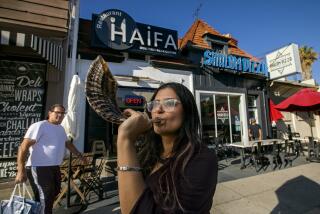Jewish Federation Allocates $600,000 to Expand Newspaper
- Share via
Directors of the Jewish Federation Council voted Tuesday to allocate more than $600,000 to expand and upgrade its weekly newspaper, a move bitterly opposed by the community’s privately owned Jewish publications and their supporters.
“Personally, I think the organized community we’ve worked hard for for 30 years is trying to destroy us, and that cannot feel good,” said Dan Brin, editor of the Heritage Southwest Jewish Press, a rival weekly.
Yale Butler, executive editor of the B’nai B’rith Messenger, said the decision means his publication will have its “back to the wall” if the expanded Jewish Community Bulletin draws away his readers and advertisers.
But Marcie Greenberg, who chaired a committee that recommended the change, said, “The community-building role has not been fulfilled by anyone before. There are many Jewish papers. The fact is that none of them has fulfilled this role, and we found that deplorable.”
The decision came after a 1 1/2-hour debate on a report calling for loans of $376,000 the first year and $287,000 the second to establish a corporation that would publish a larger, better-staffed version of the Bulletin.
Greenberg said that the Bulletin would maintain its role as house organ for the federation--the Jewish community’s fund-raising umbrella organization--while striving to operate as an independent newspaper. It would be protected from pressure by a board of 25 directors. The president of the federation would name the first 13, who would in turn select 12 more members, Greenberg said.
According to Ted Kanner, executive vice president of the federation, the new Bulletin could be on its feet by the Jewish New Year, which begins at sundown Sept. 15.
But Milton G. Gordon, a board member who spoke against the move, said the federation should not compete with existing publications.
In addition to Brin’s and Butler’s publications, local Jewish newspapers include Israel Today, based in the San Fernando Valley, and L.A. Jewish Life, a new monthly. Yet another weekly, called The Jewish Newspaper, is set to begin publication at the end of February.
Figuring in fringe benefits and interest charges on the federation’s five-year, 10% loan, the actual cost of revamping the Bulletin could exceed $1 million, Gordon told the closed-door meeting.
“The only way to make it successful is to aggressively pursue advertisers,” he said later, recalling his comments to the board. “I don’t see how the independents could survive.”
Indeed, the economic aspects of the expansion of the Bulletin proved most controversial Tuesday, according to sources who were at the luncheon meeting.
Although other aspects of the venture were approved by substantial margins, the vote was closest--55-39--on the financial arrangements, they said.
“I just felt the expenditure of this kind of money from charity funds was not a function of the Federation Council,” Gordon said. “I hope I’m wrong, but I don’t think I am. I hope it’ll be successful, the independents will survive, and we’ll raise more money and have a better community as a result of it, but I don’t see it.”
He also argued that the loan should be secured by a guarantor, saying, “If the paper goes under, who’s going to pay the money back?”
In her statement, Greenberg said Los Angeles is the only major Jewish community in the country without a widely circulated weekly publication.
“We need to publish weekly, if we’re going to have any continuity,” she said. “There’s no way a biweekly can do any of those things.”
She also said that with introduction of standard newspaper practices, such as demographic studies and brochures explaining the nature of the Bulletin readership, advertisers would be attracted in significant numbers.
“Given the professionalism that a good publication should have, it would be self-sustaining soon,” she said.
The Bulletin, which began publishing every week on an experimental basis last year, goes to 75,000 homes in a community of more than 500,000 Jews citywide.
Heritage Publisher Herb Brin says his circulation is 13,000, while Butler declined to reveal the Messenger’s circulation.
More to Read
Sign up for Essential California
The most important California stories and recommendations in your inbox every morning.
You may occasionally receive promotional content from the Los Angeles Times.













